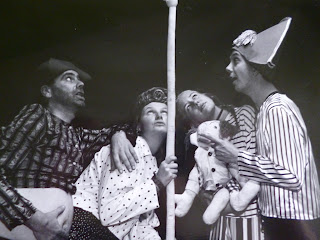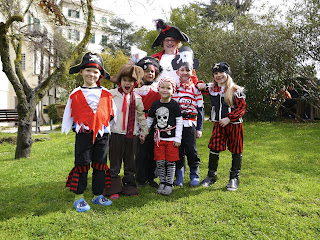Today we have a guest post from Steve Gladwin. Steve's background is in theatre, but he has recently published his first children's book: The Seven. (Ed)
After recently attending my first Charney* and running a
drama workshop on character I decided to trace the origins of my ‘image work’
as a writer, performer and storyteller. So here we go...
The Mad Girl and The Dream first
collided in spring 1996. At the time I was running a small theatre-in-education
company in Bridgwater in Somerset. We rehearsed in the skittle alley of a pub
called the West India House, (that was why all our productions were long and
thin). We dosed up with Marion’s double egg and chips every lunchtime, which
were a thing of beauty.
I had been asked by Wells Central
Junior school whether we could do a Tudor Day for them. I said of course we could - having no
idea how to set about it. What they really wanted, it turned out, was a fifty
minute Midsummer Night’s Dream: we were currently touring the full length
version of the play. We decided to begin in the morning with a new invention of
mine called a ‘Potted History of The Tudors’, (basically an excuse to play all
six wives with different wigs and combine facts with terrible jokes), which
also left room for two workshops. In the morning we had the Armada, with all
the excitement of ‘cut and pluck’, the fire ships and the extraordinary fate of
the Rata Santa Maria Encoronada. (Look it up!) After the play itself, we had St
John’s Fair: a recreation of a Tudor Fair complete with all its denizens.
Meanwhile I was left with the tricky
problem of telling a Shakespeare play in no more than fifty minutes. Not an
easy task...
Luckily it was the play’s trickiest
scene, Act Three Scene Two, which provided an unexpected solution. Because it
is so complicated, I suggested showing the complex moonlit love life of Hermia,
Lysander, Helena and Demetrius through eight stages and still images. There
must have been some magic hanging around in the skittle alley that day, because
one thing led seamlessly to another and we realised that what worked for one
scene might also work for the whole play. With about thirty five pictures under
our belt we had tremendous fun running them all first forwards and then,
hilariously, backwards. We were ready for our lunchtime egg and chips.
Thus was born a method of theatre and
storytelling which I have used ever since. It can be passed on to anyone, and
now I'm passing it on to you.
It’s very simple and here it is. You
begin by breaking up the play or story into a series of still images or
tableau. To those you add any basic dialogue you need. So in the first scene
with the warring fairies your dialogue might go like this.
Oberon Ill met by
moonlight proud Titania.
Titania. What
jealous Oberon. Fairies skip hence. I have foresworn his bed and company.
And so on.
Armed with the basic pictures and
dialogue, you can now add a narrator to bridge the gaps between the two and
move the story forward. Then the magic happens: you can freeze one
scene/tableau and transform it into the next. The most memorable example of
this was during our two hander of Cinderella, ‘Ashputtel’, where Hannah as the spirit
of the dead mother in the tree ‘handed down’ the dress to ‘Sue as Ashputtel.
Immediately afterwards this image changed to the two sisters squabbling to grab
the royal invitation.
 |
The rude mechanicals from the Brothers Tales production of A Midsummer Night’s
Dream circa 1996.
|
The great thing about the method is
that you can use it anywhere. In storytelling, for example, where it is often
called ‘the bones’. Or in the creation of your own plot by visualising those
pictures - and crucially, the transformation from one to the other. It is also
an excellent method to use with children and adults who struggle with language
and respond to a more visual medium.
But let’s return to that day and St
John's Fair, where I first met not only the Mad Girl but also a whole host of other
Elizabethan ne’er do wells. Our workshops followed an apprentice goldsmith
called Watt and his new wife Jane as they travelled through the fair on their
way to a new life. Like most things in Tudor England, it didn’t have a
particularly happy ending. A year later a pregnant Jane returned to the country
alone leaving Watt rotting in a debtors' prison.
But it did introduce me to a whole host
of infectious new characters, such as the dummerer, the palliard, the ruffler,
the prigger prancer and best of all, the Tom and Bess O’ Bedlams. These two
used to pretend to be mad - stinking and screaming so much that people would
pay to get rid of them. Bess has recently muscled her way back into my life,
demanding that I tell her story. I’ll leave you to find out more about the
others and maybe tell theirs.
Just make sure you think of them in pictures as well
as words!
*Editor's note: 'Charney' is the annual summer conference/retreat of the Scattered Authors' Society, which hosts this blog. Steve did a workshop there this year based on the process he outlines in this post. Oh, how silly we all were!








































